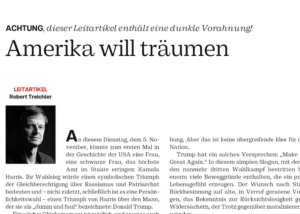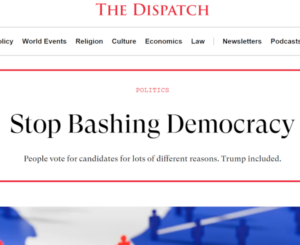This incredibly powerful and deadly accurate speech was delivered in the French Senate on March 4, 2025 by French Senator Claude Malhuret. This may some day take its rightful place alongside the best of Sir Winston Churchill and President John F Kennedy.
“President, Mr. Prime Minister, Ladies and Gentlemen Ministers, My dear colleagues,
Europe is at a critical turning point in its history. The American shield is crumbling, Ukraine risks being abandoned, Russia strengthened.
Washington has become the court of Nero, a fiery emperor, submissive courtiers and a ketamine-fueled jester in charge of purging the civil service.
This is a tragedy for the free world, but it is first and foremost a tragedy for the United States. Trump’s message is that there is no point in being his ally since he will not defend you, he will impose more customs duties on you than on his enemies and will threaten to seize your territories while supporting the dictatorships that invade you.
The king of the deal is showing what the art of the deal is all about. He thinks he will intimidate China by lying down before Putin, but Xi Jinping, faced with such a shipwreck, is probably accelerating preparations for the invasion of Taiwan.
Never in history has a President of the United States capitulated to the enemy. Never has anyone supported an aggressor against an ally. Never has anyone trampled on the American Constitution, issued so many illegal decrees, dismissed judges who could have prevented him from doing so, dismissed the military general staff in one fell swoop, weakened all checks and balances, and taken control of social media.
This is not an illiberal drift, it is the beginning of the confiscation of democracy. Let us remember that it took only one month, three weeks and two days to bring down the Weimar Republic and its Constitution.
I have faith in the strength of American democracy, and the country is already protesting. But in one month, Trump has done more harm to America than in four years of his last presidency. We were at war with a dictator, now we are fighting a dictator backed by a traitor.
Eight days ago, at the very moment that Trump was rubbing Macron’s back in the White House, the United States voted at the UN with Russia and North Korea against the Europeans demanding the withdrawal of Russian troops.
Two days later, in the Oval Office, the military service shirker was giving war hero Zelensky lessons in morality and strategy before dismissing him like a groom, ordering him to submit or resign.
Tonight, he took another step into infamy by stopping the delivery of weapons that had been promised.
What to do in the face of this betrayal? The answer is simple: face it.
And first of all, let’s not be mistaken. The defeat of Ukraine would be the defeat of Europe. The Baltic States, Georgia, Moldova are already on the list. Putin’s goal is to return to Yalta, where half the continent was ceded to Stalin.
The countries of the South are waiting for the outcome of the conflict to decide whether they should continue to respect Europe or whether they are now free to trample on it.
What Putin wants is the end of the order put in place by the United States and its allies 80 years ago, with its first principle being the prohibition of acquiring territory by force.
This idea is at the very source of the UN, where today Americans vote in favor of the aggressor and against the attacked, because the Trumpian vision coincides with that of Putin: a return to spheres of influence, the great powers dictating the fate of small countries.
Mine is Greenland, Panama and Canada, you are Ukraine, the Baltics and Eastern Europe, he is Taiwan and the China Sea.
At the parties of the oligarchs of the Gulf of Mar-a-Lago, this is called “diplomatic realism.”
So we are alone.
But the talk that Putin cannot be resisted is false. Contrary to the Kremlin’s propaganda, Russia is in bad shape. In three years, the so-called second largest army in the world has managed to grab only crumbs from a country three times less populated.
Interest rates at 25%, the collapse of foreign exchange and gold reserves, the demographic collapse show that it is on the brink of the abyss. The American helping hand to Putin is the biggest strategic mistake ever made in a war.
The shock is violent, but it has a virtue. Europeans are coming out of denial. They understood in one day in Munich that the survival of Ukraine and the future of Europe are in their hands and that they have three imperatives.
- Accelerate military aid to Ukraine to compensate for the American abandonment, so that it holds, and of course to impose its presence and that of Europe in any negotiation. This will be expensive. It will be necessary to end the taboo of the use of frozen Russian assets. It will be necessary to circumvent Moscow’s accomplices within Europe itself by a coalition of only the willing countries, with of course the United Kingdom.
- Second, demand that any agreement be accompanied by the return of kidnapped children, prisoners and absolute security guarantees. After Budapest, Georgia and Minsk, we know what agreements with Putin are worth. These guarantees require sufficient military force to prevent a new invasion.
- Finally, and this is the most urgent, because it is what will take the most time, we must build the neglected European defence, to the benefit of the American umbrella since 1945 and scuttled since the fall of the Berlin Wall.
It is a Herculean task, but it is on its success or failure that the leaders of today’s democratic Europe will be judged in the history books.
Friedrich Merz has just declared that Europe needs its own military alliance. This is to recognize that France has been right for decades in arguing for strategic autonomy.
It remains to be built. It will be necessary to invest massively, to strengthen the European Defence Fund outside the Maastricht debt criteria, to harmonize weapons and munitions systems, to accelerate the entry into the Union of Ukraine, which is today the leading European army, to rethink the place and conditions of nuclear deterrence based on French and British capabilities, to relaunch the anti-missile shield and satellite programs.
The plan announced yesterday by Ursula von der Leyen is a very good starting point. And much more will be needed.
Europe will only become a military power again by becoming an industrial power again. In a word, the Draghi report will have to be implemented. For good.
But the real rearmament of Europe is its moral rearmament.
We must convince public opinion in the face of war weariness and fear, and especially in the face of Putin’s cronies, the extreme right and the extreme left.
They argued again yesterday in the National Assembly, Mr Prime Minister, before you, against European unity, against European defence.
They say they want peace. What neither they nor Trump say is that their peace is capitulation, the peace of defeat, the replacement of de Gaulle Zelensky by a Ukrainian Pétain at the beck and call of Putin.
Peace for the collaborators who have refused any aid to the Ukrainians for three years.
Is this the end of the Atlantic Alliance? The risk is great. But in the last few days, the public humiliation of Zelensky and all the crazy decisions taken in the last month have finally made the Americans react.
Polls are falling. Republican lawmakers are being greeted by hostile crowds in their constituencies. Even Fox News is becoming critical.
The Trumpists are no longer in their majesty. They control the executive, the Parliament, the Supreme Court and social networks.
But in American history, the freedom fighters have always prevailed. They are beginning to raise their heads.
The fate of Ukraine is being played out in the trenches, but it also depends on those in the United States who want to defend democracy, and here on our ability to unite Europeans, to find the means for their common defense, and to make Europe the power that it once was in history and that it hesitates to become again.
Our parents defeated fascism and communism at great cost.
The task of our generation is to defeat the totalitarianisms of the 21st century.
Long live free Ukraine, long live democratic Europe.”
__________

 First, there was a lead article in the news magazine
First, there was a lead article in the news magazine  In the same issue,
In the same issue,  Finally, three days after the election
Finally, three days after the election